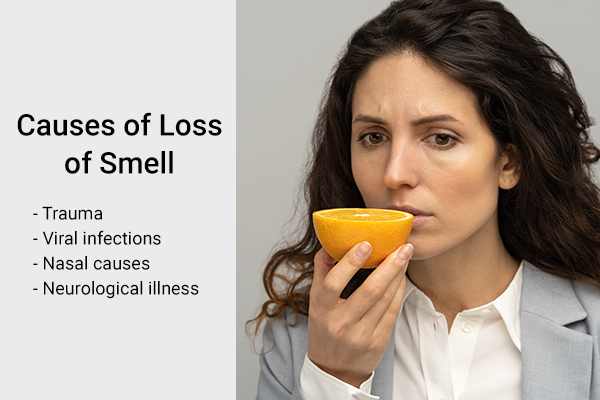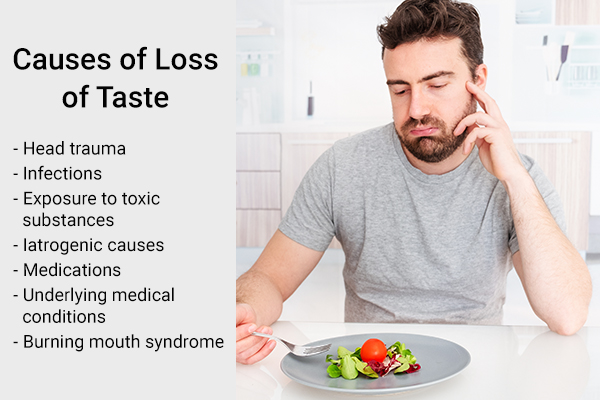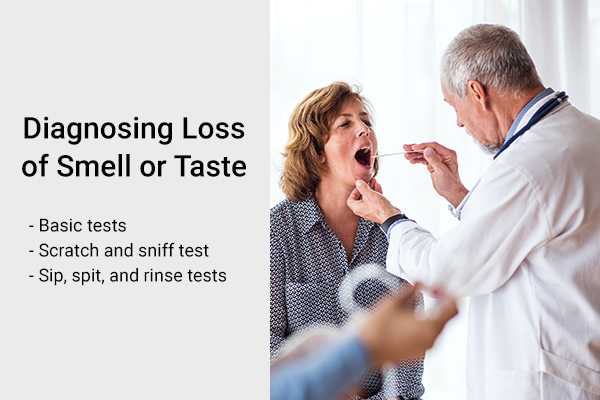In this article:
Loss of smell and taste can significantly impact an individual’s quality of life. Smell and taste disorders can affect a person’s ability to enjoy food, which can lead to poor nutrition, weight loss, and decreased energy.

Loss of smell can also affect an individual’s ability to detect danger signals, such as smoke or gas leaks, which can be dangerous. Additionally, the loss of the ability to smell can lead to social and emotional consequences, such as feelings of isolation or depression. (1)
Read on to take a little deeper look into these conditions.
Loss of Smell
- Anosmia: Anosmia refers to the total inability to smell, whereas specific anosmia refers to the inability to perceive a specific odor despite being able to perceive other odors normally. Functional anosmia refers to a significantly reduced ability to smell, even though some smell sensations may still be present.
- Hyposmia: Hyposmia refers to a reduced ability to smell, which can affect an individual’s ability to perceive smells at a normal level.
- Hyperosmia: Hyperosmia refers to an enhanced ability to smell, which can result in an individual being more sensitive to odors than the average person.
It is important to note that all of these conditions can be caused by a variety of factors, including genetic factors, illness, injury, medication, and exposure to environmental toxins. (1)(2)
Causes of loss of smell
Here are some factors that may lead to loss of smell in an individual. (1)

1. Trauma
Trauma to the head or nasal passages can cause severance of the nerve fibers responsible for transmitting signals from the olfactory epithelium to the olfactory bulb in the brain. (3)
2. Viral infections
Viral infections, such as COVID-19, the common cold, and influenza, are believed to cause damage to the olfactory receptor neurons (ORNs) in the nasal cavity, although the exact mechanism is not yet fully understood. (4)
3. Nasal causes
Nasal causes such as sinusitis or nasal polyps can also affect the sense of smell. In sinusitis, inflammation of the sinus cavities can interfere with the passage of odor molecules to the olfactory epithelium.
4. Neurological illness
Finally, smell disorders associated with aging or neurological illnesses such as Parkinson’s disease or Alzheimer’s disease can also occur. As a person ages, the olfactory epithelium may degenerate, and this can lead to a decline in the sense of smell.
In neurological illnesses, the brain’s ability to process olfactory signals may be impaired due to damage or degeneration of specific brain regions that are involved in olfactory processing. (5)
Loss of Taste
- Ageusia, hypogeusia, and hypergeusia: Ageusia refers to a complete loss of the ability to taste, while hypogeusia is a partial loss of taste sensitivity. Hypergeusia, on the other hand, refers to an enhanced sensitivity to taste. Ageusia is a relatively rare condition, as the taste system has a redundant innervation – this means that if some taste nerves are damaged or lost, others can compensate. However, complete loss of taste can occur as a result of certain medical conditions, medications, or head injuries. (1)
- Dysgeusia: Dysgeusia is a more common taste disorder and refers to an impaired or distorted sense of taste. It can manifest as a range of different taste perceptions, but patients often describe it as metallic, bitter, or unpleasant. (1)(6)
Causes of loss of taste
The causes of taste disorders can be broadly categorized into several different groups.

1. Head trauma
Head trauma can lead to damage in the central nervous system regions that process taste stimuli, which leads to taste disorders. (7)
2. Infections
Infections of the upper respiratory tract such as COVID-19 can affect the taste buds directly or indirectly by causing inflammation or damage to the nerve fibers responsible for taste sensation. (1)
3. Exposure to toxic substances
Exposure to toxic substances such as heavy metals, pesticides, or chemicals can also damage the taste buds and affect taste perception. (1)
4. Iatrogenic causes
Iatrogenic causes, which refer to taste disorders caused by medical or dental treatments, can occur due to various procedures that involve the mouth or head, such as radiation therapy, chemotherapy, and oral surgeries. (1)
5. Medications
Certain medications can also cause taste disorders, including antibiotics, antihistamines, and chemotherapy drugs. (1)
6. Underlying medical conditions
Underlying medical conditions, such as hypothyroidism, diabetes, and liver disease, can also affect taste sensation. Additionally, poor oral hygiene and the use of mouth rinses can cause a range of taste disorders. (1)
7. Burning mouth syndrome
Burning mouth syndrome (BMS) is a type of taste disorder characterized by a persistent burning sensation in the mouth, often accompanied by hypogeusia and a lasting bitter or metallic taste. BMS is most commonly seen in postmenopausal women. (8)
Can I recover from the loss of smell?
A higher residual ability to smell, typically measured using olfactory testing, has been associated with a greater likelihood of recovery from anosmia.
Female gender and younger age have also been identified as favorable factors for recovery, although the reasons for these associations are not fully understood.
Nonsmokers may have a better prognosis for recovery from anosmia, as smoking has been shown to have a negative impact on olfactory function.
Additionally, the presence of initial parosmia, a condition where smells are distorted or perceived differently than normal, has been associated with a better prognosis for recovery.
The absence of left and right differences in the sense of smell, as well as larger amplitudes of chemosensory evoked potentials to trigeminal stimuli, has also been associated with a better prognosis for recovery from anosmia.
Finally, the duration of the smell disorder can be a relevant factor in predicting the prognosis for recovery. In general, the longer the duration of the anosmia, the lower the likelihood of recovery.
However, it is important to note that the prognosis for recovery can vary widely depending on the underlying cause of the anosmia, and individual cases should be evaluated by a healthcare professional. (1)
Diagnosing Loss of Smell or Taste
Here’s how doctors diagnose loss of smell or taste:

1. Basic tests
In these tests, the patient is asked to identify different smells such as soap, coffee, and cloves. The doctor presents these smells to each nostril and checks if the patient can recognize them.
Note: Sometimes, they might use irritants such as alcohol and ammonia to test the sensitivity of the fifth cranial nerve, which is responsible for sensing pain.
2. Scratch and sniff test
This one’s a fun test! In this test, the doctor gives you an object that’s been coated with a microfragrance. When you scratch the coating, it releases scent molecules into the air, allowing you to smell it.
3. Sip, spit, and rinse tests
In these tests, the doctor applies chemicals to specific areas of your tongue. You might be asked to sip, spit, or rinse with these substances. This helps the doctor assess your taste perception and determine if there are any abnormalities.
When to See a Doctor
If you experience a sudden loss of taste and smell, it is advisable to consult a doctor as soon as possible.
If you have other symptoms such as fever, cough, or difficulty breathing, seek medical attention immediately, as these could be signs of a serious illness such as COVID-19.
Your doctor can evaluate your symptoms, perform a physical exam, and recommend further testing or treatment if necessary. If you have been diagnosed with COVID-19, your doctor can also provide guidance on how to manage your symptoms and prevent the spread of the virus to others.
Moreover, your doctor will check for obvious causes, such as sinusitis or nasal polyps, which cannot be checked at home.
Final Word
Taste and smell are also closely linked, and loss of one sense can affect the other, which leads to an altered perception of flavors.
Therefore, it is important for individuals who experience changes in their sense of smell and taste to seek medical attention to identify the underlying cause and determine the appropriate treatment.
 Continue Reading7 Home Remedies for Loss of Smell and Taste
Continue Reading7 Home Remedies for Loss of Smell and Taste
- Was this article helpful?
- YES, THANKS!NOT REALLY


